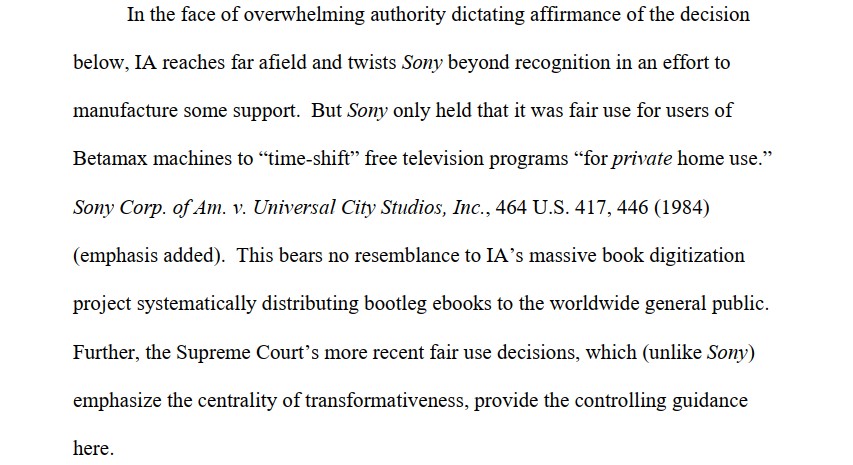In 2020, publishers Hachette, HarperCollins, John Wiley and Penguin Random House sued the Internet Archive (IA) for copyright infringement, equating its ‘Open Library’ to a pirate site.
IA’s library operates as a non-profit organization that scans physical books, which can then be loaned out in an ebook format. Patrons can also borrow books that are scanned and digitized in-house, with technical restrictions that prevent copying.
Staying true to the centuries-old library concept, only one patron at a time can rent a digital copy of a physical book. These restrictions were temporarily loosened at the height of the COVID-19 epidemic when IA launched the National Emergency Library.
Publishers vs. Internet Archive
The self-scanning approach differs from the licensing deals other libraries enter into. Not all publishers are happy with IA’s service which triggered a massive legal battle four years ago.
Publishers Hachette, HarperCollins, John Wiley, and Penguin Random House filed a lawsuit, equating IA’s controlled digital lending (CDL) program to a piracy operation. Last year, a New York Federal court concluded that the library is indeed liable for copyright infringement.
The Court’s decision effectively put an end to IA’s self-scanning library, at least for books from the publishers in suit, but IA isn’t prepared to let go without a fight. Last December, the non-profit filed its opening brief at the Second Circuit Court of Appeals, hoping to reverse the judgment.
Publishers Respond to IA’s Appeal
IA argued that its scanning-and-lending activities amount to fair use. They cited expert witnesses who concluded that there’s no financial harm and further argued that the service is substantially different from the ebook licensing market.
Late last week, the publishers filed a redacted copy of their reply brief at the Second Circuit Court of Appeals. According to the companies, IA engaged in “massscale infringement” by making digital copies of physical books without permission from the works’ rightful owners.
The IA-digitized books are then lent to patrons instead of officially-licensed ebooks, which the publishers see as a direct threat to their rights and business.
“Controlled digital lending is a frontal assault on the foundational copyright principle that rightsholders exclusively control the terms of sale for every different format of their work – a principle that has spawned the broad diversity in formats of books, movies, television and music that consumers enjoy today,” the publishers write.
The publishers state that more than 93% of the public libraries in the US license ebooks through official channels. IA refuses to do so, arguing that making their own digital copies of legitimately purchased books amounts to fair use.
Not a VCR
IA views these digital copies as “transformative” and argues that its scan-and-digitize practice is fair use. In the appeal brief, the library equated it to the digital copies of video broadcasts, which people can legally make following the Betamax decision.
The publishers, however, maintain that IA’s lending operation is an effort to bypass official licensing channels, arguing that it has little to do with how people could use a VCR for private use.
“IA reaches far afield and twists Sony beyond recognition in an effort to manufacture some support. But Sony only held that it was fair use for users of Betamax machines to ‘time-shift’ free television programs ‘for private home use’.
“This bears no resemblance to IA’s massive book digitization project systematically distributing bootleg ebooks to the worldwide general public,” the publishers add.

The book publishers believe that IA is headed into uncharted waters, where no other library has ever gone. While IA sees its lending program as a logical and widely accepted step, the rightsholders frame it as a novel digital threat.
“Public libraries […] have never engaged in mass-digitization of millions of commercially available print books and distributed the resulting ebooks to anyone with an internet connection; they have never systematically evaded publishers’ terms of sale for specific formats like ebooks; they have never partnered with a used bookstore to funnel books to offshore scanning facilities..,” the publishers write.
All About Control
IA and several supporters, including the Authors Alliance and various copyright scholars, previously argued that publishers currently have too much power and control.
Allowing libraries to scan and digitize their books would certainly limit this control, but the publishers believe that’s clearly against the law.
“In short, IA’s practice of CDL is radical and unlawful. A decision deeming CDL fair use would have a dire impact on book publishing and all creative industries. Libraries around the country could skirt the current library ebook markets, fundamentally interfering with the Publishers’ digital strategies and destabilizing book markets,” they write.
A Napster Moment?
The publishers fear a ‘Napster moment’ for books if outsiders can run their own digitization programs and operate distribution platforms, without the involvement of rightsholders. Napster has shown that this is a viable threat and recent legal discussions surrounding the use of copyrighted works for AI training make this a very relevant issue today.
“Indeed, as technology companies ‘train’ generative AI products on vast numbers of books and other media, maintaining legal protection for derivative uses has never been more important,” the publishers note.
“The long-range disruptions in the music industry caused by Napster and other file sharers are a cautionary tale on the dangers of illicit copying that deprives rightsholders of the ability to control their markets.”
Interestingly, Napster’s existence arguably provoked the foundation of a new music industry model. It proved to be a large inspiration for innovators including Spotify’s Daniel Ek, who pioneered the music streaming business that generates most of the industry’s revenue today.
The publishers don’t elaborate on the broader implications of Napster, but they likely refer to the drastic decline in music sales that took place shortly after the service gained popularity.
The publishers ask the court to affirm the lower court’s decision, which currently prevents IA from lending out digitized copies of its books. The request is backed by a series of detailed legal arguments and citations in the full brief, which can be accessed here (pdf).
From: TF, for the latest news on copyright battles, piracy and more.
Source : Publishers Cite Napster and AI Training Threats in Legal Battle with the Internet Archive











